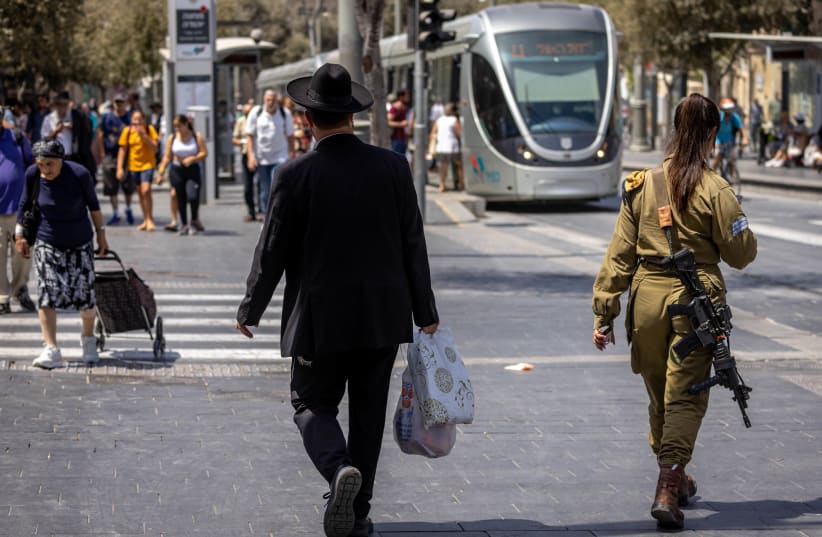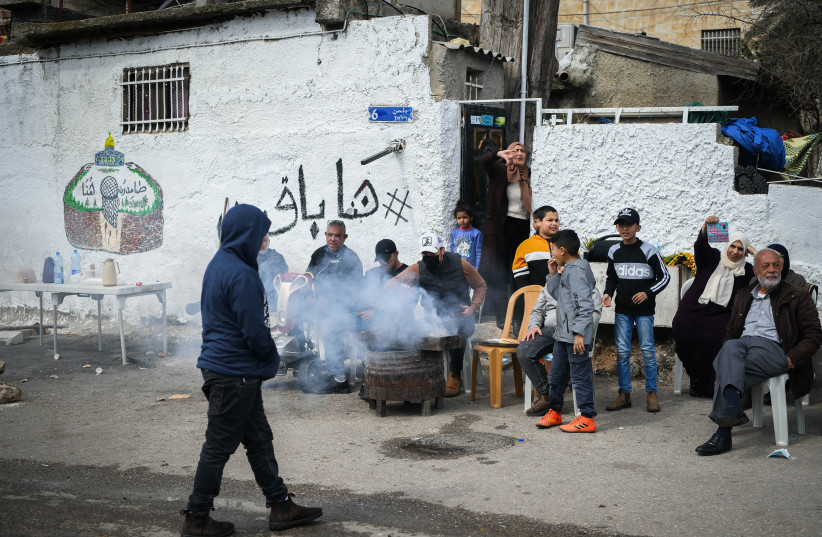Jerusalem remains Israel’s largest city with 984,500 residents, about 10% of the entire country’s population, according to data published by the Central Bureau of Statistics (CBS) on Wednesday, ahead of Jerusalem Day.
In December 2022, some 60.8% of the city’s population was Jewish or non-Arab, while 39.2% was Arab. Some 29% of the city’s residents are haredim (ultra-Orthodox), and thus comprise almost half of the city’s Jewish population.
An estimated 44% of the capital’s residents – 23% of Jewish ones and 78% of Arab ones – reported difficulties in covering their monthly expenses.
The capital’s population grew by about 13,200, but more people left the city than moved to it. The rise was accounted for by 20,200 additional births while 8,500 arrived and 15,500 left for other localities.
Most new arrivals came from Beit Shemesh, Tel Aviv and Bnei Brak. Most who left moved to Beit Shemesh, Tel Aviv and Givat Ze’ev.
Children under 15 account for 33% of the city’s population, while only 9.6% are over the age of 64, making Jerusalem a relatively “young” city compared with other municipalities. In the 2021-2022 school year, some 85,144 children studied in Hebrew elementary schools in the city, including about 58,000 children in haredi schools, 15,000 in religious public schools and 12,000 in secular public schools.
The percentage of 12th grade students eligible for a matriculation certificate remained very low, at 39% compared to the national average of 71%.
There were some 7,000 weddings in 2021. The average age of first marriage in Jerusalem is slightly lower than the national average.
The birth rate in Jerusalem stands at 3.86 children per family, higher than the national average of 3. It is higher among Jews and non-Arabs than among Arabs: 4.39 compared to 3.09.
On average, Jerusalem women have their first child at almost 25, three years earlier than elsewhere in the country.
Most Jerusalemites are satisfied with their lives in the city
Only half (50.4%) of the city’s population is part of the workforce in Jerusalem, compared to almost two-thirds (63.3%) across the country.
About two-thirds (65%) of the city’s residents over 20 have lived in Jerusalem since birth. Nearly 90% over 20 are satisfied with their lives in the city, similar to the national average, while 93% of employed Jerusalemites report a high degree of job satisfaction. Some 55% are satisfied with their financial situation, which ethnically breaks down to 74% of Jews and 26% of Arabs.
As many as 86% of Jerusalem’s residents use the internet.
About half of the 44,000 university and college students in Jerusalem are from the area with 19,400 at the Hebrew University, 18,400 at eight academic colleges and 6,300 at five colleges for education.
In 2020, about 2,000 Jerusalem residents stood trial for criminal offenses, of whom some 1,600 (80%) were convicted.
In mid-2022, there were 241,118 residential apartments in Jerusalem, 1.1% more than in 2021. Nationwide, the average growth was 1.9%.
In the capital, the ratio of population to apartments stands at four people per apartment, compared to a national average of 3.3 people per apartment.
In 2022, a record 7,280 building permits were issued for new apartments, about 9.3% of all building permits issued in Israel that year, and twice as many as in 2021.
More than 40% of garbage was recycled, compared to 23.5% nationwide. Jerusalem stands first among the 18 largest cities in Israel for recycling.
Some 43% of Jerusalemites are satisfied with the amount of green space near their homes, but this breaks down to 65% of satisfied Jewish residents and 7% of Arab ones.
Jerusalemites used about 68.2 cubic meters of water per person in 2021, about 15% less than the national average of 80 c.m. per person.
Complaints about a lack of parking space near their homes were made by 69% of Jerusalem residents 20 or older while 28% complained about the noise near their homes.
While 27% reported discrimination in the past year, that figure almost doubled to 53% of the haredi population.

